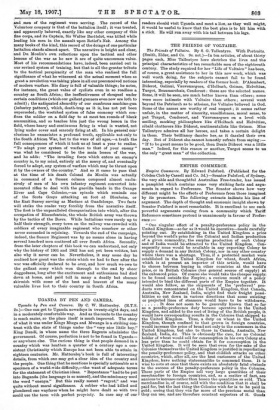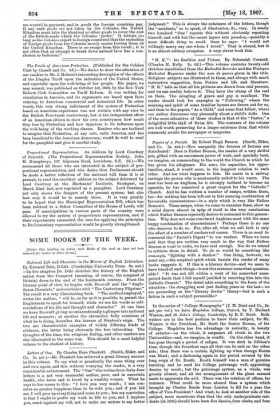EMPIRE COMMERCE.
Empire Commerce. By Edward Pulsford. (Published for the Cobden Club by Cassell and Co. 8d.)—Senator Pulsford, of Sydney, the very able and thoughtful Australian Free-trader, has issued a pamphlet which contains some very striking facts and arguments in regard to Preference. The Senator shows how very different might be the effects of Preference from those imagined by its promoters. The following extracts indicate his line of argument. The depth of thought and economic insight shown by Senator Pulsford is most remarkable. It is excellent to see such powerful arguments coming from a community which Tariff Reformers sometimes pretend is unanimously in favour of Preference "One singular effect of a penalty-preference policy in the United Kingdom—so far as it would be operative—needs carefully pointing out By establishing in the 'United Kingdom a price beyond the world's price for the Colonial and Indian production of a given commodity, the surplus production of each Colony and of India would be attracted to the United Kingdom. Consequently none would be available in any exporting Colony to supply a demand in any British Colony, nor in any other country where there was a shortage. Thus, if a protected market were established in the United Kingdom for wheat, South Africa, which is at present an importer of this article, would have to choose between buying in other countries at the world's price, or in British Colonies (her general source of supply) at the enhanced price. Of course she would take the cheaper supply, to be found outside the Empire; a curious result of a policy intended to bind the different parts of the Empire together. It would also follow, as the shipments of the 'preferred' products were concentrated on the United Kingdom, that Canada, Australia, New Zealand, India, might find their freight possibilities so cut down in various directions that some existing. or projected lines of steamers would have to be withdrawn.
It does not seem to be generally known that so far as a penalty-preference duty became operative in the United Kingdom, and added to the cost of living of the British people, it. would have corresponding results in the Colonies that shipped to the United Kingdom. Thus, a duty on wheat in the United Kingdom, though confined to that grown in foreign countries, would increase the price of bread not only to the consumers in the United Kingdom, but also to those in Canada, Australia, New Zealand, India, &c. This is obviously the case, for no Colonial holder of wheat would sell for consumption in his own Colony at a less price than he could obtain for it for consumption in the United Kingdom. It will be seen that even for the sake of the Colonies themselves the United Kingdom is justified in repudiating. the penalty-preference policy, and that childish attacks on other countries, which, after all, are the hest customers of the United Kingdom, have nothing statesmanlike to commend them. It is wise to note at once that there exists an absolutely fatal obstacle to the success of the penalty-preference policy in the Colonies. These parts of the Empire sell very largo quantities of their merchandise to foreign countries, and, as a matter of fact, are anxious to increase rather than lessen the quantities so sold. This merchandise is, of course, sold, with the condition that it shall be paid for, but the last thing the Colonies wish for is to be paid in gold ; seeing that they win far more of the precious metal than they can use, and are therefore constant exporters of it. Goods are wanted in payment, and in goods the foreign countries pay. If any such goods are not taken by the Colonies, the United Kingdom must take the identical or other goods to cover the cost of the British-made which the Colonies prefer.' It follows (so long as the Colonies export to foreign countries) that the excluding of foreign goods from the Colonies merely means forcing them on the United Kingdom. There is no escape from this result ; it is not often that an attempt to break down natural laws has a conclusion so ludicrous."
The Fruits of American Protection. (Published for the Cobden Club by Cassell and Co. 3d.)—We desire to draw the attention of our readers to Mr. J. Hobson's interesting description of the effects of the Dingley Tariff upon the industries of the United States, and especially upon the well-being of her people. His paper, we may remark, was published on October let, 1906, by the New York Reform Club Committee on Tariff Reform. It was written for circulation in America, and its arguments are based upon facts relating to American commercial and industrial life. In other words, this very strong indictment of the system of Protection based on American experience was not written with any view to the British Free-trade controversy, but is the independent effort of an American citizen to show his own countrymen how much they lose by Protection and how injurious is its influence upon the well-being of the working classes. Readers who are inclined to imagine that Protection, at any rate, suits America, and has been beneficial to the American democracy, would do well to send for the pamphlet and give it careful study.
Proportional Representation. An Address by Lord Courtney of Penwith. (The Proportional Representation Society. John H. Humphreys, 107 Algernon Road, Lewisham, S.E. 2d.)—We recommend all those who are interested in the subject of proportional representation, and who desire that Parliament should be made a better reflection of the national will than it is at present, to read the excellent address on the subject delivered by Lord Courtney at the Mechanics' Institute, Stockport, on March 22nd last, now reprinted as a pamphlet. Lord Courtney not only shows the dangers of the present system, but also how easy it would be to remedy them. It is very greatly to be hoped that the Municipal Representation Bill, which has been referred to a Select Committee of the House of Lords, will pass. If municipalities in various parts of the country were allowed to try the system of proportional representation, and if their experiments succeeded, the case for applying the principles to Parliamentary representation would be greatly strengthened.







































 Previous page
Previous page